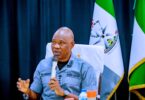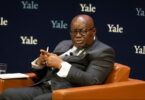The Minister of Interior, Olubunmi Tunji-Ojo, characterized the era of fuel subsidy as a cancer that was destroying Nigeria’s economy, necessitating its removal by President Bola Tinubu.
Tunji-Ojo made this statement in an interview with Channels TV on Sunday while appealing to Nigerians to be patient with the Tinubu-led administration.
According to the Minister, the President’s decision to remove the subsidy, along with other tough reforms implemented by his administration, is not only laudable but also demonstrates his boldness as a leader.
He noted that the presence of a fuel subsidy and multiple exchange rate windows meant the country lacked capital investments and its economy remained stagnant.
“Are you aware that at the time the government came on board, there was no budget for subsidy? Do you want a president to start his administration on an illegal note?
“Fuel subsidy was a cancer within the system, killing the economy of Nigeria. We were subsiding the naira. We were subsiding fuel. At the end of the day, no capital investment.
“The economy was not moving forward. If there is something I give to this president, it’s his boldness,” Tunji-Ojo said.
Speaking further, the Minister said the president cannot fix Nigeria’s economic challenges in just one year, adding that these challenges date back as far as 100 years.
He also noted that the president never campaigned as a magician but as a person ready to renew the dimmed hope of the country’s economy.
Tunji-Ojo said the country is moving in the right direction and it will take some time for the challenges to be resolved.
“The government is doing well in terms of certain indices. But when you judge the government based on its ability to solve a hundred year old problem in one year, then you might be having such an assertion.
“Let me tell you this, Mr. President never campaigned to be a magician. He campaigned on the basis of renewed hope. Before hope can be renewed, it means it has dwindled.
“When you want to reboot a hope that has gone down when you want to reprocess the system that is down, you need a bit of time. The question is are we on the right step? The answer is yes,” he added.
Following the announcement of the removal of the petrol subsidy by President Bola Tinubu on May 29, 2023, Nigeria has faced multiple economic challenges, including the highest inflation rate in 28 years and food inflation soaring over 40%.
Tinubu stated that the decision to remove the subsidy was made to protect the country’s fiscal conditions, which he believed were in a very fragile state.
In 2023 alone, the subsidy consumed over N3.5 trillion in government revenue, an allocation exceeding the combined funds for education, health, and agriculture.
However, the resulting rise in inflation has sparked significant calls for protests, particularly among the youth population.
The Presidency has repeatedly appealed to Nigerians to be patient, emphasizing that the president is doing his best to resolve the country’s issues.







